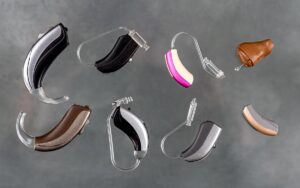Taking care of your hearing aids likely feels easy enough. After all, you were likely given a set of care guidelines when you originally purchased your devices. The majority of hearing specialists will give you a step-by-step how-to in regard to routine hearing aid maintenance. Still, getting that much information at once means you probably didn’t remember some of it. So you still may be wondering, what should my cleaning routine look like? Or, how frequently should I get my hearing aid serviced? How can I make my hearing aids last as long as possible?
If you want to keep your hearing aids in tip-top working order, check out the following tips.
Tip #1: Try not to allow your hearing aids to get wet
Moisture and electronics don’t really get along that well. Even though your hearing aids might provide a certain degree of water resistance, you generally want to keep them dry. Beyond the obvious, this means you need to do things like the following:
- Keep your hearing aids somewhere dry and cool. Many individuals question what the best way to store hearing aids is. So the steamy bathroom won’t be a great place to keep your hearing aids. It also helps to keep them in the same spot every day so you aren’t trying to figure out where you put them. In the same way, don’t leave your hearing aids just lying about, dogs love to eat them and cats love to play with them!
- Keep a dehumidifier going during those more humid months. Even indoors, high humidity means your hearing aids may be more damp more frequently. And that dampness can compromise the delicate electronics inside. Prolonging hearing aid life might mean keeping that dehumidifier going.
- When you have your hearing aids in your ears, avoid using hair care products. That is, remove your hearing aids before using a lot of hair spray or hair gel. These types of products can really gunk up your devices.
Tip #2: Check (and clean) those earwax filters
Earwax production is a healthy and normal thing for the human body to do. It’s also something that hearing aid designers recognize is going to happen. Consequently, most hearing aids are created to deal with a modest amount of earwax.
Your task is to be certain your hearing aids don’t become inundated with ear wax. So make changing out your wax guard, when needed, a regular element of your cleaning routine. You can invest in and utilize specialized cleaning tools for this, depending on your hearing aid model (ask us for guidance here).
What is the replacement schedule for earwax guards? Well, for the majority of models, it will be around once every month or so.
Tip #3: care for the batteries
Your Hearing aids count on your batteries for power. The better your hearing aid batteries are, the longer your device will last. So there are a few battery-care steps you can take:
- Keep all of the contact points on the battery clean and dry. You can wipe them with a clean cloth if they aren’t. As with most electronics, moisture will lead to a bad time here.
- Get a battery charger or a rechargeable device: This will save you lots of money on wasted batteries.
- Remember to switch off your hearing aids when you aren’t wearing them. This just drains the battery for, well, no good reason. Consequently, when you most need your hearing aids, they might not be charged enough to function.
Tip #4: Only use clean hands to handle your devices
Your hearing aids are going to spend most of their time in your ears. But they don’t get there on their own. Your hands (which are required in order to handle your hearing aids) could be covered in all kinds of offending substances. By design, hearing aids are very sensitive and probably won’t do well with things like crumbs.
It’s essential that you don’t handle your hearing aids with dirty hands. So before you put in or take out your hearing aids, give your hands a quick wash.
Tip #5 Keep us in the loop
It may feel like, once you purchase your hearing aids, you can leave your hearing specialist in the dust. But… this is not typically correct. Here are a few very good reasons why scheduling routine appointments with us is still important.:
- To clean and maintain your hearing aids.
- To track and monitor the advancement of your hearing loss.
- To help make sure your devices fit well.
What should you do when something breaks?
Sometimes, despite your best efforts, something goes wrong with your hearing aids (perhaps you accidentally step on them). You should call us as soon as you can in situations such as this.
We will be able to help you fix your devices, or get a new set if necessary.
Want to talk to us about your next set of hearing aids? Make an appointment today!
[blogcta]





